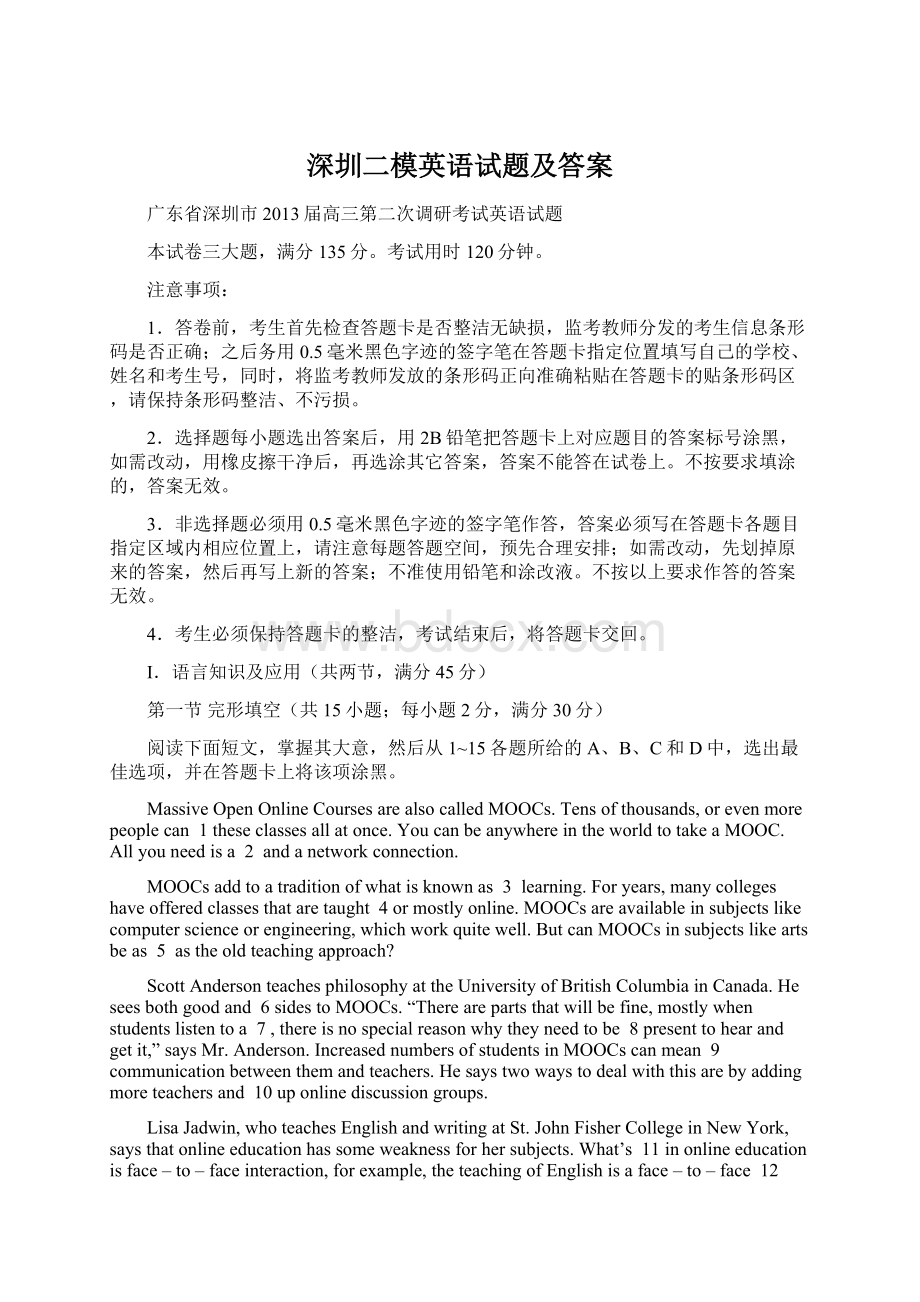深圳二模英语试题及答案.docx
《深圳二模英语试题及答案.docx》由会员分享,可在线阅读,更多相关《深圳二模英语试题及答案.docx(14页珍藏版)》请在冰豆网上搜索。

深圳二模英语试题及答案
广东省深圳市2013届高三第二次调研考试英语试题
本试卷三大题,满分135分。
考试用时120分钟。
注意事项:
1.答卷前,考生首先检查答题卡是否整洁无缺损,监考教师分发的考生信息条形码是否正确;之后务用0.5毫米黑色字迹的签字笔在答题卡指定位置填写自己的学校、姓名和考生号,同时,将监考教师发放的条形码正向准确粘贴在答题卡的贴条形码区,请保持条形码整洁、不污损。
2.选择题每小题选出答案后,用2B铅笔把答题卡上对应题目的答案标号涂黑,如需改动,用橡皮擦干净后,再选涂其它答案,答案不能答在试卷上。
不按要求填涂的,答案无效。
3.非选择题必须用0.5毫米黑色字迹的签字笔作答,答案必须写在答题卡各题目指定区域内相应位置上,请注意每题答题空间,预先合理安排;如需改动,先划掉原来的答案,然后再写上新的答案;不准使用铅笔和涂改液。
不按以上要求作答的答案无效。
4.考生必须保持答题卡的整洁,考试结束后,将答题卡交回。
I.语言知识及应用(共两节,满分45分)
第一节完形填空(共15小题;每小题2分,满分30分)
阅读下面短文,掌握其大意,然后从1~15各题所给的A、B、C和D中,选出最佳选项,并在答题卡上将该项涂黑。
MassiveOpenOnlineCoursesarealsocalledMOOCs.Tensofthousands,orevenmorepeoplecan1theseclassesallatonce.YoucanbeanywhereintheworldtotakeaMOOC.Allyouneedisa2andanetworkconnection.
MOOCsaddtoatraditionofwhatisknownas3learning.Foryears,manycollegeshaveofferedclassesthataretaught4ormostlyonline.MOOCsareavailableinsubjectslikecomputerscienceorengineering,whichworkquitewell.ButcanMOOCsinsubjectslikeartsbeas5astheoldteachingapproach?
ScottAndersonteachesphilosophyattheUniversityofBritishColumbiainCanada.Heseesbothgoodand6sidestoMOOCs.“Therearepartsthatwillbefine,mostlywhenstudentslistentoa7,thereisnospecialreasonwhytheyneedtobe8presenttohearandgetit,”saysMr.Anderson.IncreasednumbersofstudentsinMOOCscanmean9communicationbetweenthemandteachers.Hesaystwowaystodealwiththisarebyaddingmoreteachersand10uponlinediscussiongroups.
LisaJadwin,whoteachesEnglishandwritingatSt.JohnFisherCollegeinNewYork,saysthatonlineeducationhassomeweaknessforhersubjects.What’s11inonlineeducationisface–to–faceinteraction,forexample,theteachingofEnglishisaface–to–face12practice.Sotheoldapproachisnotgoingtobe13veryquicklybycomputer–aidedinstruction.
BillPogueteachescommunicationsattheUniversityofHouston–downtown.Hesaysthatafterleadingclassesformorethan30years,hewouldnotattempttoteachaMOOC.However,Mr.Pogueseesgood14inonlineeducation.Henotedastrongsenseofcommunityinanonlinecourseheoncetook.Hesaidthestudentscouldwork15onthesameprojectwhilelivingindifferentregions.
1.A.cutB.acceptC.giveD.take
2.A.computerB.telephoneC.televisionD.radio
3.A.constantB.similarC.distantD.creative
4.A.rarelyB.merelyC.partlyD.equally
5.A.expensiveB.effectiveC.sensitiveD.active
6.A.wrongB.hadC.rightD.positive
7.A.lectureB.chatC.debateD.contest
8.A.physicallyB.spirituallyC.mentallyD.commercially
9.A.betterB.moreC.lessD.fewer
10.A.gettingB.lookingC.makingD.setting
11.A.obtainedB.lostC.exposedD.preferred
12.A.carefulB.basicC.attentiveD.interactive
13.A.turnedB.takenC.missedD.removed
14.A.ideaB.formC.valueD.habit
15.A.togetherB.alongC.outdoorsD.again
第二节语法填空(共10小题;每小题1.5分,满分15分)
阅读下面短文,按照句子结构的语法性和上下文连贯的要求,在空格处填入一个适当的词或使用括号中词语的正确形式填空,并将答案填写在答题卡标号为16~25的相应位置上。
Acouplehadbeenmarriedforover60years.Theysharedeverything,talkedabouteverythingandkeptnosecrets16eachotherexceptthatthewomanhadaboxinadrawer17shehadcautionedherhusbandnevertoopenoraskherabout.
He’dneverthoughtaboutiteversince.Oneday18womangotverysickandthedoctor,saidshewouldn’trecover.Tosortouttheiraffairs,thehusbandtookdowntheboxand19(bring)ittohiswife’sbedside.Sheagreeditwastimethatheshouldknow20wasinthebox.
21(open)it,hefoundtwosmalltablematsandasumofmoneytotaling$25,000.Heaskedheraboutthecontents.“Whenweweretobemarried,”shesaid,“mygrandmatoldmethesecretofhappy22(marry)wasnevertoargue,andIshouldjustkeepquietandmakeamat23Igotangrywithyou.”
Themanwasso24(move)thathehadtofightbacktears.Shehadonlybeenangrywithhimtwiceinallthoseyearsoflivingandloving!
“Honey,”hesaid,“thatexplainsthemats,butwhataboutthemoney?
Wherediditcomefrom?
”
“Oh,”shesaid,“that’sthemoneyImadefromselling25.”
II阅读(共两节,满分50分)
第一节阅读理解(共20小题;每小题2分,满分40分)
阅读下列短文,从每题所给的A、B、C和D中,选出最佳答案,并在答题卡上将该项涂黑。
A
Amousehappenedtolookthroughaholeinthewalltoseethefarmerandhiswifeopenapackage.“Whatfoodmightthiscontain?
”Themousewondered.Buthewassadtodiscoveritwasamousetrap.
Backtothefarmyard,themouseannouncedthiswarning;“Thereisamousetrapinthehouse!
Thereisamousetrapinthehouse!
”
Thehenclucked(咯咯地叫)andscratched,raisedherheadandsaid,“Mr.Mouse,Icantellthisisagreatconcerntoyou,butitisofnoconsequencetome.Icannotbebotheredbyit.”
Thenthemouseturnedtothepig.Thepigsympathized,butsaid,“Iamsoverysorry,Mr.Mouse,butthereisnothingIcandoaboutitbutpray.Beassuredyouareinmyprayers.”
Thenthemouseturnedtothecowandrepeatthesamewords.Thecowsaid,“Moo,Mr.Mouse.I’msorryforyou,butit’snoskinoffmynose.”
So,themousereturnedtothehouse,headdownandsadlyfacedthefarmer’smousetrapalone.Thatveryrightasoundwasheardthroughoutthehouse–thesoundofamousetrapcatchingitsprey(猎物).Thefarmer’swiferushedtoseewhatwascaught.Inthedarkness,shedidnotseeit.Itwasapoisonoussnakewhosetailwascaughtinthetrap.Thesnakebitthefarmer’swife.Thefarmerrushedhertothehospital.Whenshereturnedhome,shestillhadafever.
Everyoneknowsfreshchickensoupisgoodtotreatafever.Sothefarmertookhisknifetothefarmyard.Thehenwaskilled.
Buthiswife’ssicknesscontinued.Friendsandneighborscametositwithheraroundtheclock.Tofeedthem,thefarmerbutcheredthepig.
Thefarmer’swifedidnotgetwellbutdied.Somanypeoplecameforherfuneralthatthefarmerhadthecowkilledtoprovideenoughmeatforallofthemforthelunch.
Themouselookeduponitallfromhisholeinthewallwithgreatsadness.
26.Whatsurprisedthemousewhenlookingthroughthehole?
A.Thefarmerandhiswife.B.Adangerousmousetrap.
C.Apackagewithfoodin.D.Apoisonoussnake.
27.Whatdidthemousedowhenitreturnedtothefarmyard?
A.Ithadawarntalkwithhisfriends.
B.Itwarneditsneighborsofthedanger.
C.Itarguedwithitsneighborsloudly.
D.Ittriedhardtocheeritsneighbors.
28.WhichofthefollowingisNOTmentionedinthestory?
A.Thehenwassurethatitneedn’tbebotheredbyit.
B.Thepigonlyexpresseditssympathyforthemouse.
C.Thefarmer’swifewasbittenbythepoisonoussnake.
D.Thefarmer’sneighborscametohishomeformeat.
29.Whatdoestheunderlinedsentence“butit’snoskinoffmynose”inparagraph5mean?
A.Itisnoneofmybusiness.B.Itisoutofthequestion.
C.Itdoesn’taffectmysmell.D.Itisnotinterestingatall.
30.Whichofthefollowingcanbestexpressthemoralofthestory?
A.Mindworksfasterintimeofdanger.
B.Neverputyournoseintoothers’business.
C.Weshouldpulltogetherintimeoftrouble.
D.Outofsight,outofmind.
B
Allofusshouldkeepakitchendiary,showinghowmuchfoodareleftuneatenasgarbage.
Weallwastefood,youandmemillionsoftonsofit.InChina,enoughfoodiswastedinrestaurantseveryyeartofeed200millionpeople.IntheUnitedStates,40percentoffoodiswastedfromfarmtofork.Eachyear,theamountoffoodthrownawayinrichcountriesisalmostthesameasthatproducedinsub–SaharanAfrica.Thisraisessomeimportantquestions.
Indevelopingcountries,foodislostbecausefarmersdonothaveappropriatecooling,storageormarketaccessfortheircrops.Theirgrains,fruitsandvegetablesdryupandrotaway.Indevelopedcountries,thepictureisdifferent,andfoodiswastedinsupermarkets,restaurantsandathome.Chinafacesbothproblems,significantlossesinfarms,aswellasatthesaleandconsumptionstages.AndtheamountoffoodwastedbyChineseconsumersisrapidlyincreasing.
ConsumerculturehasfilledChinaandurbanresidentscangetqualityfoodfromanywhereinthecountryandfromacrosstheplanet.Chineseconsumersareasparticularabouttheirfoodasthoseinothercountries.Insupermarkets,theyrefusetobuyvegetablesthatdon’tlookfreshorhaveanirregularshape,ormilkandotherproductsclosetotheirexpiry(失败)date.
Besides,Chineseconsumerstendtobegenerous.Inrestaurantsorathome,oftentoomuchfoodisorderedorcookedandserved.Sowhiletroopingoutofarestaurant,fullandhappy,withcolleaguesorfriends,theyneverlookbackatwhat’sleftuntouchedonthetable.ShouldChineseconsumerstakemoreresponsibilityforthewastetheycreate?
Everyonedeservestohaveenoughfoodtoeat.DespiteChina’simpressivesuccessinreducinghungeroverthepastthreedecades,thejobisnotcompletedyet.
31.Accordingtoparagraph1,weknowthatfoodwasteis.
A.hugeworldwideB.mainlyinUSA
C.onlyinrichcountriesD.justinAfricancountries
32.Indevelopingcountries,foodislostmainly.
A.forthelackofcoolingandstorageB.becauseofeasyaccesstomarkets
C.becauseofthewetweatherD.becauseofthequalityofthefood
33.ThemainreasonforfoodwasteinChinais.
A.theeffectofconsumercultureB.theconvenientfoodsupply
C.theworryaboutfoodqualityD.people’sbeingparticularaboutit
34.HowdoChinesefeelwhentheyleaverestaurantswithmuchfoodleftbehind?
A.Generous.B.Unconscious.C.Wealthy.D.Valuable.
35.Thepurposeofthepassageistotellus.
A.nottowasteanyfoodfromnowon
B.thenecessitytoimprovefoodquality
C.thefactoffoodwasteindevelopedcountries
D.theinfluenceofconsumercultureonChinese
C
We’resowelleducated–butwe’reuselessstudentswhohavelostth